Apr 5, 2016 | News
by Michael Baggot
On Monday April 4, the Department of Jurisprudence hosted a morning of study dedicated to “Neuroscience: Ethics and Law” at Libera Università Maria Ss. Assunta (LUMSA). The event featured presentations from both UNESCO Chair Director Alberto García and UNESCO Chair Fellow Alberto Carrara. A flyer of the event can be read here.
After the presentations, García moderated a round table discussion on Neuroscience between Rabbi Riccardo Di Segni, Chief Rabbi of the Hebrew community in Rome; Dr. Maria Angela Falà, President of Interreligious Dialogue of the Maitreya Foundation; Imam Yahya Sergio Yale Pallavicini, Director of Interreligious Dialogue for the Mosques of Rome.
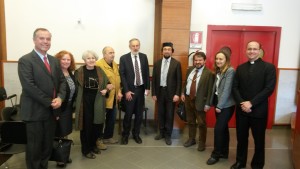 LUMSA Law Professor Laura Palazzani introduced the morning of study. Since 2002, Palazzani has served on Italy’s National Committee of Bioethics. She is currently the organization’s Vice-President.
LUMSA Law Professor Laura Palazzani introduced the morning of study. Since 2002, Palazzani has served on Italy’s National Committee of Bioethics. She is currently the organization’s Vice-President.
In December, García moderated an interreligious round table discussion on religious liberty with the same panel scheduled to meet again at the LUMSA. A summary of the stimulating dialogue and video footage of the exchange can be found online here.
Those interested in learning more about the UNESCO Chair’s commitment to exploring the world’s most relevant bioethical issues from a multicultural and interreligious perspective are welcome to read more about the upcoming workshop on “Bioethical Challenges in Neurogenomics from an Interreligious and Multicultural Perspective” November 14-16 at Houston’s renowned MD Anderson Cancer Center.
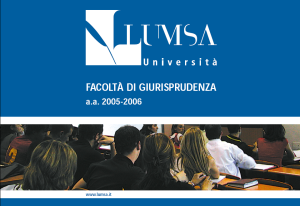
Mar 19, 2016 | News
Prof. Dr. Alberto Carrara, Coordinator of the Italian Research Group of Neurobioethics (GdN) and Fellow of the UNESCO Chair in Bioethics and Human Rights, gave students of various faculties a mini-course on Posthumanism at the Universidad Popular Autónoma del Estado de Puebla (UPAEP) in Mexico March 14-18, 2016.
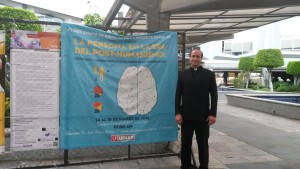
The intensive course was entitled “The Person in the Posthumanistic Era: Technology and neurosciences in the light of neurobioethics.” In addition to being accredited by the DANA Foundation within the World Brain Awareness Week 2016, the event was also part of the Faculty of Medicine’s Week of Bioethics.
The first chapter of Carrara’s presentation focused on the technological and neuroscientific discoveries that may generate futuristic trans- and post- humanisms. For example, he highlighted the first head transplant planned for 2017, the evolution of robotics, the efforts to humanize robots and the robotization of man. Carrara also explained various technological interfaces (brain-machine, brain-brain) and the notion of “telepathy” in the context of modern communication. (View the PREZI presentation here).
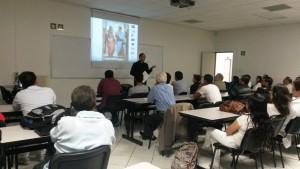
In the second chapter, Carrara advanced philosophical reflections based upon technological and neuroscientific applications to human life. His presentation on the philosophy of technology featured a critique of the post-humanist author Nick Bostrom and explored the paradoxes of the various attempts to address the problems of the soul-body, mind-body, and mind-brain relations. He also explained the foundations the cybertechnological myth of immortality. Modernity has witnessed three great paradigm shifts that ground contemporary posthuamanistic visions. First, the Cartesian division of the two constitutive realities of man, that is the material and spiritual component in such a way that they are considered radically heterogeneous. Second, the Lockean identity of consciousness and personhood. Finally, the reduction of human corporality to mere mechanism. The chapter concluded with a reflection upon the three main paradoxes of posthumanism regarding virtual reality (View the PREZI presentation here).
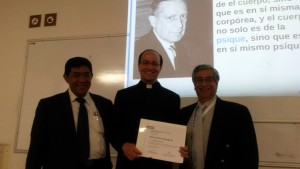
Nov 4, 2015 | News
The Idente Foundation for Study and Research recently published a bilingual edition of the proceedings for the Metaphysics 2012 5th World Conference. Three members of the Neurobioethics Research Group (GdN) contributed to the conference: Dr. Paola Ciadamidaro, Dr. Alberto Passerini (S.I.S.P.I), and Dr. Manuela De Palma (S.I.S.P.I).
The work is available for free download as a .pdf file. Click the following link to be redirect to the download page:
http://www.romemetaphysics.org/index.php/encuentros-precedentes/world-conference-2012/221-proceedings-fifth-world-conference-on-metaphysics
Oct 23, 2015 | News
The Neurobioetics Research Group (Gruppo di Neurobioetica-GDN) opened its 7th year with its first meeting of the 2015-2016 school year on October 23, 2015. The meeting reviewed the many activities of the previous school year 2014-2015. In addition to the monthly workshop meetings, several members of the GdN participated in meetings and conferences at national and international level. The meeting can be seen online here. You can read the full report of the group here.
In addition to its work in Italy, the GdN has been involved at the international level, particularly with conferences in conventions, conferences and university courses in Mexico, Chile and Spain. GdN members also expect to work in in Portugal and Brazil in 2015-2016.
Furthermore, the GdN “twin” research group BINCA, founded a number of years ago in the Anáhuac University of Mexico City, continues its work in the country of Mexico.
The GdN will dedicate the year to exploring the nature, definition, and status of the field of “neuroesthetics” from an interdisciplinary perspective. In particular, the group is planning for its convention during the March 2016 Dana Foundation Brain Awareness Week, in cooperation with the S.I.S.P.I.(Scuola di Specializzazione con la Procedura Immaginativa).
The next seminar will be held Friday, November 27 at 17:00.
Mar 18, 2015 | News
The VII Congress of Neuroethics in Padova on the theme “Who Feels What? The Neuroethics of brain, mind and consciousness” will take place on May 13-15 in l’Aula Musatti of the University of Padua’s School of Psychology. A call has been made for both papers (click here) and for posters (click here). The event coincides with the II Congress of the Italian Society of Neuroethics and Philosophy of Neuroscience.
Keynote Speakers (among others)
Enrico Alleva, Cnr Roma
Jean-Pierre Changeux, College de France, Paris
Tim Crane, Cambridge University
Walter Glannon, Calgary University
John Harris, Manchester University
Marcello Massimini, Università degli Studi di Milano
Ingmar Persson, Oxford University
Massimo Reichlin, Università Vita-Salute San Raffaele, Milano
Pier Cesare Rivoltella, Università Cattolica del Sacro Cuore, Milano
 LUMSA Law Professor Laura Palazzani introduced the morning of study. Since 2002, Palazzani has served on Italy’s National Committee of Bioethics. She is currently the organization’s Vice-President.
LUMSA Law Professor Laura Palazzani introduced the morning of study. Since 2002, Palazzani has served on Italy’s National Committee of Bioethics. She is currently the organization’s Vice-President.



